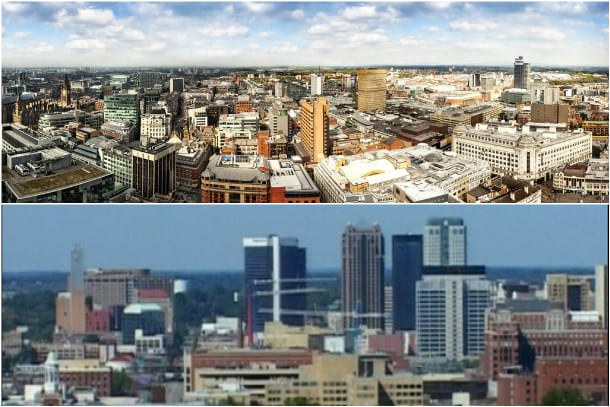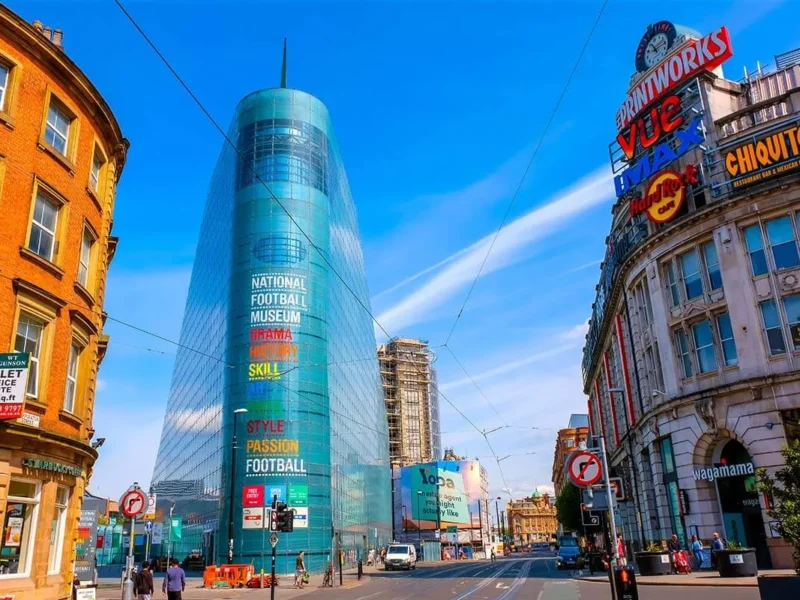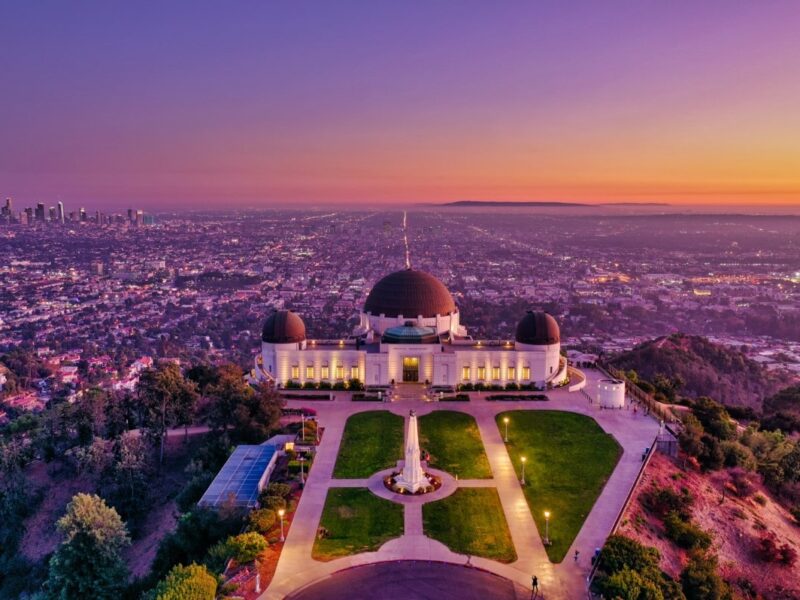For people who want a lively culture and exciting jobs in creative and tech fields, Manchester is the better place to live. But if you care about money and a calm lifestyle, Birmingham might be the right pick because it’s cheaper and has lots of parks.
Birmingham is bigger, with 1.15 million people, while Manchester has 553 thousand. But if we include Greater Manchester, it’s 2.6 million, making it more popular for tourists and on social media.
The best city for you depends on what you like and what you want to do. Birmingham and Manchester both have cool things about them, so they’re both great places to live and explore.
How do the populations of Birmingham and Manchester compare?
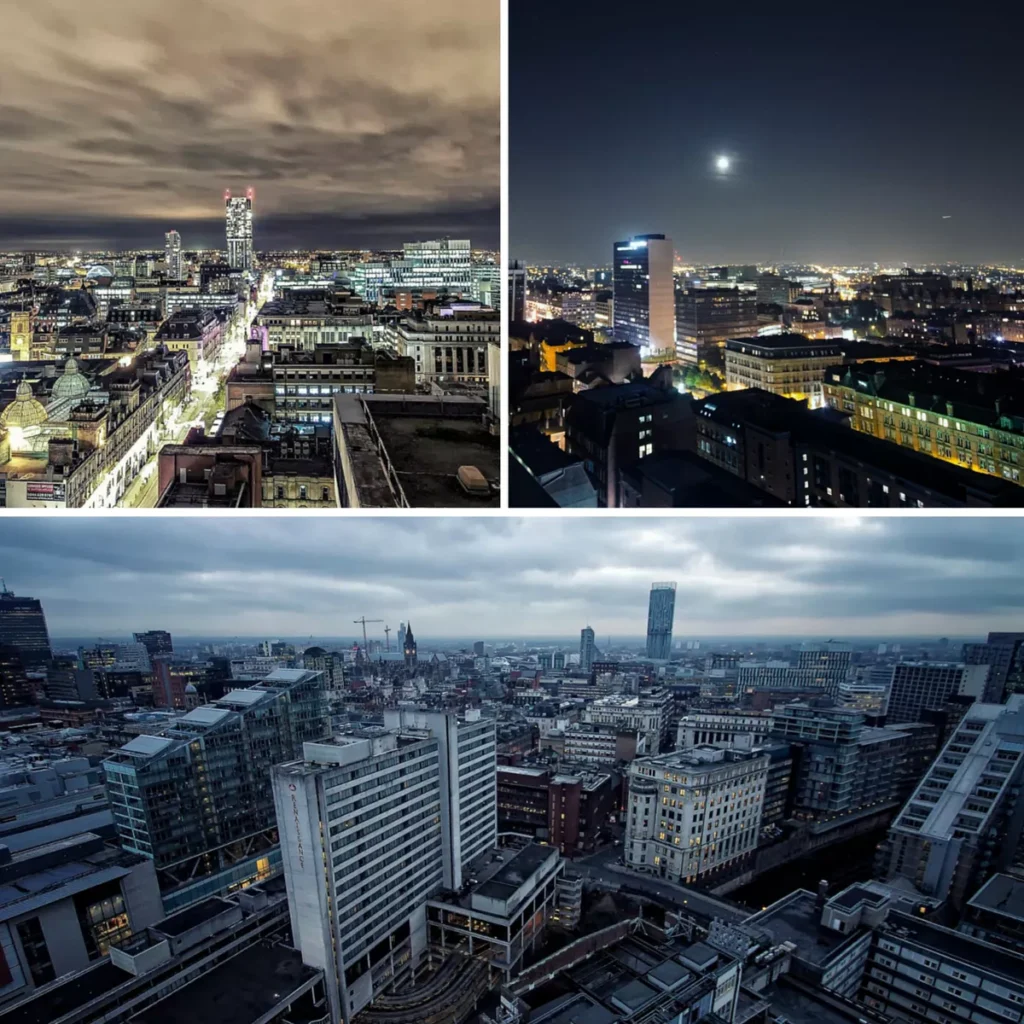
Let’s explore the population comparison between Birmingham and Manchester
Birmingham
Birmingham is a big city with lots of people – around 1.15 million of them! That’s a huge number, making it one of the busiest cities in the whole of the United Kingdom.
Because there are so many people living there, Birmingham is considered a major urban center, meaning it’s a really important and busy place in the country.
In addition to its large population, Birmingham is a big city with a lot of land – it covers a large area, much more than Manchester.
The cityscape of Birmingham includes many different neighborhoods, places where people work, and parks. This shows that Birmingham is a big, spread-out city with lots of different areas to explore and live in.
Manchester
On the other hand, Manchester has about 553 thousand people living within its city boundaries. Even though it’s smaller than Birmingham in terms of population, Manchester is still an important city in the UK.
It has a strong history in industry and a lively cultural scene, making it a significant place to visit and live in.
However, if we look at the Greater Manchester region, which includes smaller towns and suburbs around the city, the population grows a lot.
It’s about 2.6 million people in total. This shows that Manchester is not just the city itself, but also the surrounding areas, making it a big and bustling metropolitan area.
Looking at the whole Greater Manchester area shows how much it matters. It’s not just about the city itself – it’s about all the towns and suburbs nearby too.
This big area has a big impact on the economy and culture, with lots of different communities and industries making it strong.
Economic Strengths and Industries of Birmingham
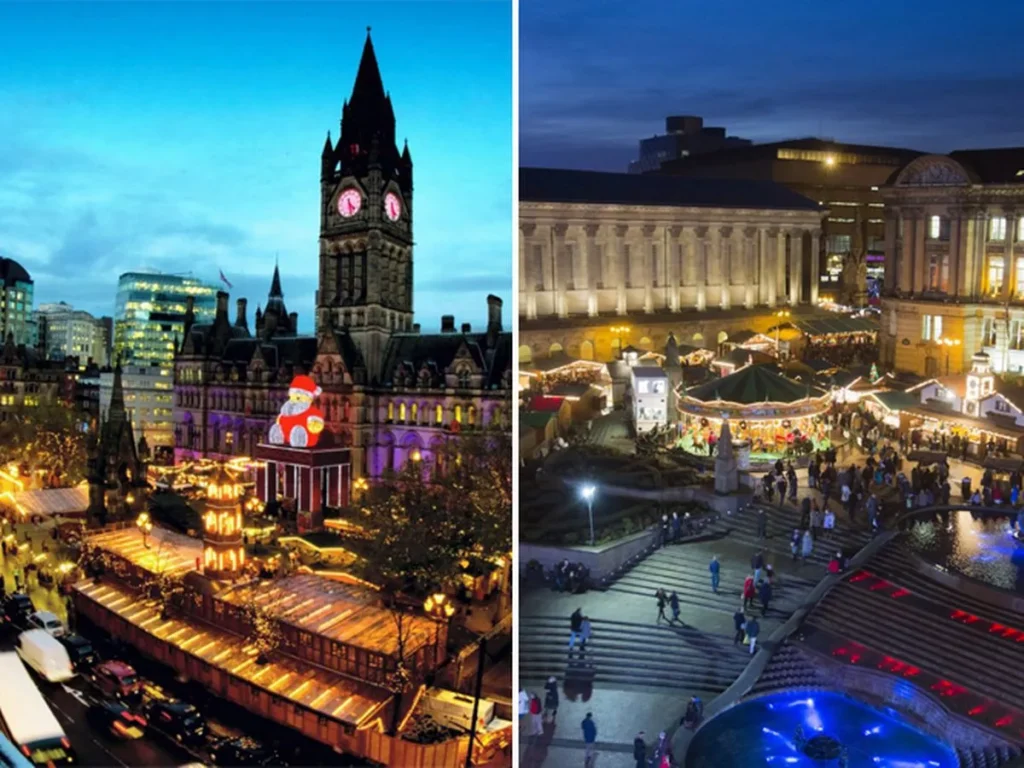
Birmingham is doing really well economically and is one of the best cities in England. Let’s have a look
Gross Domestic Product (GDP)
Birmingham’s economy ranks among the most prosperous in England. The estimated GDP in Birmingham was £32 billion in 2021, according to the Office for National Statistics (ONS).
The city experienced impressive GDP growth of 7.2% per year between 2020 and 2021.
Major Industry Sectors
This industry is the largest in Birmingham, accounting for 17.0% of all jobs in the area.
Other significant sectors include financial services, legal services, business services, biotechnology, advanced manufacturing, environmental technologies, tourism, global sports brands, media, and real estate.
Job Market and Employment
Birmingham has a working-age population (aged 16-65) of 750,167.
The city recorded an employment rate of 92.3% in 2022, slightly below the national average of 96.1%.
Approximately 589,000 jobs exist in Birmingham, representing 1.9% of the total reported jobs in England.
The job density (jobs per member of the working-age population) is 0.79 in Birmingham.
Average Salary
The median average salary for full-time employees in Birmingham was £34,037 in 2023.
Economic Strengths and Industries of Manchester
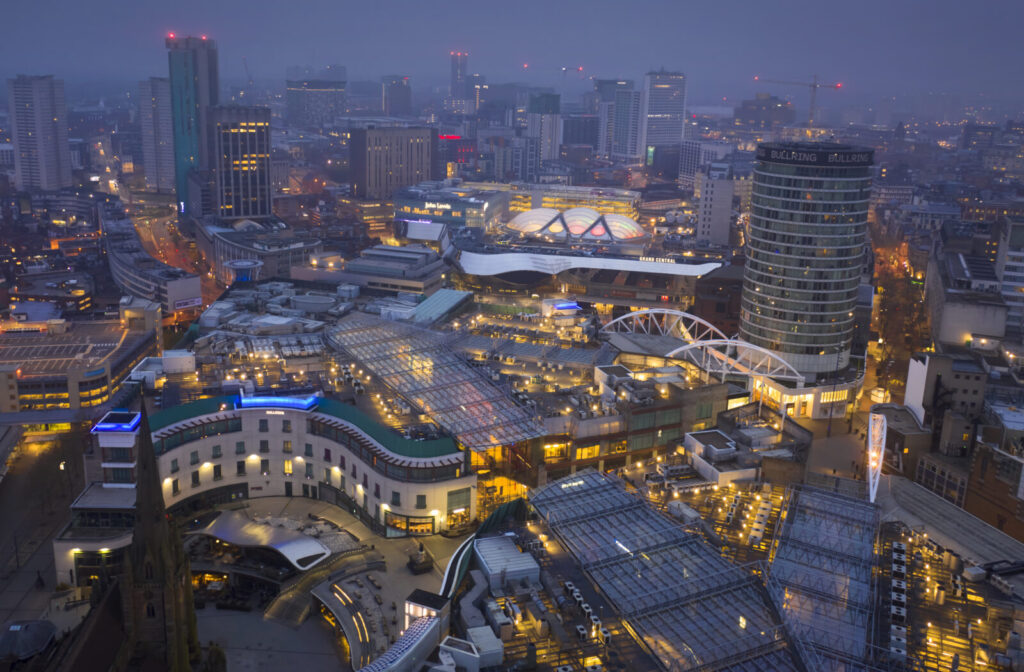
Manchester’s economy is booming! It’s expected to be one of the UK’s fastest-growing cities, with lots of new jobs and growing industries. Let’s find out what’s making Manchester’s economy grow so fast.
Gross Value Added (GVA) Growth
Manchester’s economy is predicted to be the UK’s third-fastest growing between 2024 and 2026.
The annual average GVA growth is expected to be 2.5%, outpacing the national growth rate (2.1%).
Only Reading (2.7%) and London (2.6%) are projected to see faster growth than Manchester.
Key Sectors
Manchester’s economic outlook is supported by the strength of its professional, scientific & technical, and financial & insurance activities sectors.
The city has established itself as a national tech hub and is home to key players in the video games industry.
Employment Growth
Manchester is expected to record the fastest rate of employment growth of any UK town or city from 2024 to 2026.
Job numbers in the city are forecast to grow 1.8% per year over this period, surpassing the national average.
Recovery from the Pandemic
Manchester’s economic output is forecast to be 97.8% of its pre-pandemic levels by the end of 2022.
Greater Manchester’s output is even closer to pre-pandemic levels, at 99.1% of 2019 levels.
Cost of Living Comparison
Let’s explore the cost of living in Birmingham and Manchester, including housing, groceries, transportation, and quality-of-life considerations
Housing Costs
Birmingham
Rent prices in Birmingham are 9.8% lower than in Manchester.
The average monthly rent for a one-bedroom city center apartment in Birmingham is around £750.
In Birmingham, you can choose from old neighborhoods with history or new ones with modern buildings.
Manchester
In Manchester, the rent prices are a bit higher, averaging around £850 for a similar apartment. Manchester’s housing market is busy because lots of students, workers, and families want to live there.
Groceries and Everyday Expenses
Birmingham
In Birmingham, prices for things other than rent are 8.4% lower than in Manchester. Grocery prices are 13.6% lower in Birmingham, making everyday things cheaper. Eating out at restaurants is also 9.4% cheaper there.
Manchester
While Manchester has a higher cost of living, it offers a vibrant urban lifestyle.
Grocery prices are slightly higher, but the city’s diverse food scene compensates for it.
Transportation
Both cities have efficient public transportation systems. Birmingham’s transportation costs are generally more budget-friendly.
Manchester’s extensive tram network connects the city and surrounding areas.
Quality of Life Considerations
Birmingham
Birmingham’s lower cost of living allows residents to allocate funds for leisure, hobbies, or savings. The city possesses parks, canals, and nearby natural areas like Lickey Hills. Birmingham hosts theaters, museums, festivals, and a rich arts community.
Manchester
Manchester’s job market and career prospects are strong, especially in tech and finance. The city offers cultural events, nightlife, and a thriving music scene.
Manchester’s access to the Peak District and Lake District appeals to outdoor enthusiasts.
What cultural attractions are there in Birmingham and Manchester?
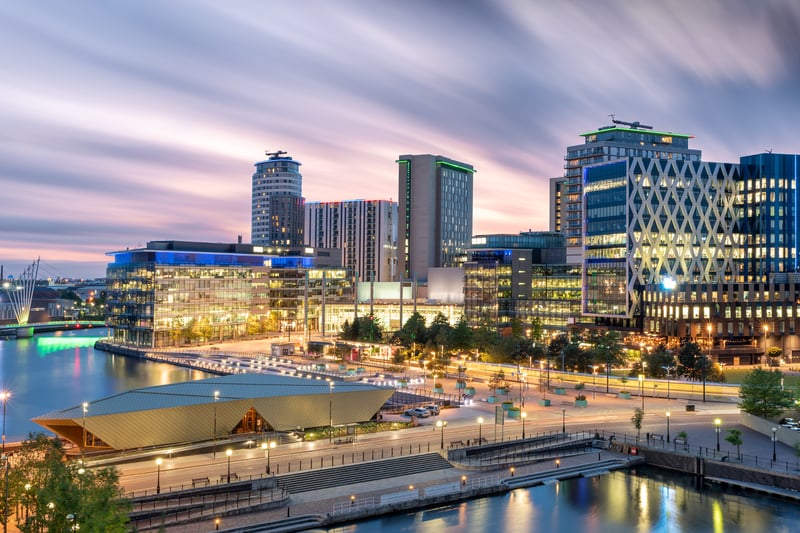
Birmingham and Manchester both boast a rich cultural scene with plenty of attractions to explore.
In Birmingham, you can learn about the city’s history and culture at the Birmingham Museum and Art Gallery. It has lots of old art and things from long ago for you to see and learn about.
At the Symphony Hall and Birmingham Repertory Theatre in Birmingham, you can see amazing shows. They have everything from classical music concerts to exciting theater performances for you to enjoy.
In Manchester, you can visit the Manchester Art Gallery to see beautiful art. They have amazing paintings by famous artists like Vincent van Gogh and the Pre-Raphaelite painters.
In Manchester, music is a big deal. Places like the Manchester Arena and The Hacienda nightclub are famous for hosting great music events. The Hacienda even helped make dance music popular across the UK.
FAQ
Is Birmingham growing faster than Manchester?
According to estimates, Manchester’s population is expected to grow by 56,000 by 2034, while Birmingham’s population is projected to increase by 81,400 between 2018 and 20281.
Is Birmingham closer than Manchester?
Yes, Birmingham is relatively close to Manchester. Both cities are located in the United Kingdom, with Birmingham situated in the West Midlands region and Manchester in the North West. The distance between them is approximately 80 miles or 130 kilometers.
Which city is very close to Manchester UK?
Liverpool is one of the best cities to visit near Manchester. It’s just a 49-minute train ride away and offers a rich history, culture, and iconic landmarks like the Three Graces and The Cavern Club.
How many Muslims are in Greater Manchester?
About 15% of Greater Manchester’s 2.5 million population is Muslim, largely due to an influx of workers from Asia since the 1960s.
Can I afford to live in Manchester?
While not cheap, the city center of Manchester is still quite affordable compared to London or other big cities worldwide. Rent prices are relatively low, especially in areas like the Northern Quarter
Final thoughts
Whether Birmingham or Manchester is better depends on what you’re looking for. Birmingham might be best if you want a lower cost of living and lots of parks and cultural activities.
But if you’re after a vibrant city with higher job opportunities and more happening, Manchester could be the one for you. Both cities have their own unique charm, so it’s worth exploring both to see which suits you best.

